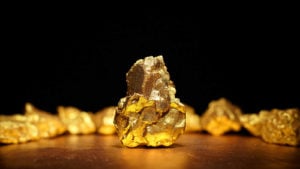Furthermore, conflicts in the Middle East and several other global incidents have contributed to the demand for gold this year. This is evident from the performance of gold ETFs, such as SPDR Gold Shares ETF (NYSE:GLD), which increased by over 14% year-to-date.
Unsurprisingly, the demand for gold stocks is at an all-time high, and many investors are interested in them. This article highlights three of the best gold stocks to invest in this July.
Equinox Gold (EQX)

Equinox Gold (NYSE:EQX) is a Canadian growth-focused mining company that operates solely in the Americas. It has eight gold mines spread over several countries, including Canada, Brazil, Mexico, and the U.S., all working towards the goal of achieving over a million ounces of annual gold production.
Equinox Gold established itself as a formidable player in the gold industry at the height of the gold price surge last year. It generated over 150,000 ounces of gold during that period, and 546,000 ounces total that year. While it has not been able to replicate its previous feats this year, the company has performed reasonably well and is currently undergoing an expansion phase.
It recently acquired the remaining interest in Greenstone Gold Mine, a Canadian gold mining outfit. The company announced the Greenstone gold mine will begin production later this year and will be one of the largest gold mines in the country.
On the financial front, Equinox Gold has not performed too poorly this year. Its recent quarterly report indicates decent earnings across key metrics, such as revenue and net income.
Alamos Gold (AGI)

Alamos Gold (NYSE:AGI) is a Canadian intermediate gold producer and mining outfit. It operates three gold mines across Canada and Mexico and boasts several growth projects in Turkey and the US.
The combination of a diversified asset base, life-long gold production and a portfolio of impressive, diverse, low-cost growth projects makes Alamos Gold an attractive option for stock market investors. The company’s commitment to global sustainability practices is another factor that makes it attractive. It is notable for its low-cost production profile and advocacy for sustainable mining practices, evidenced by its latest ESG report.
Furthermore, the company has recently embarked on an expansion phase, acquiring Argonaut Gold, a low-cost North American gold producer. It announced via a press release that it will merge both operations to create “one of the largest and lowest cost gold mines in Canada.”
The addition of the Argonaut mine is expected to increase Alamos Gold’s production to over 600,000 per year and potentially exceed 900,000 ounces per year in the long term.
Financially, Alamos Gold is one of the gold industry’s best performers. It consistently delivers strong production results, as seen by its latest quarterly report where it saw a 25% increase in revenue, generating an all-time high of $1 billion. Its earnings per share also increased by almost 500% and generated an impressive $124 million in free cash flow from operations.
Kinross Gold (KGC)

Kinross Gold (NYSE:KGC) is a gold and silver mining company based in Ontario, Canada. It operates six active gold mines in several countries, including Canada, Brazil, Chile, Mauritania and the U.S. Kinross Gold is a major player in the global gold industry and was ranked fifth in the “10 top Gold-mining Companies” list published by Investing News Network in 2019.
Kinross Gold boasts several high-profile assets and subsidiaries in its portfolio, such as Red Back Mining, Eastwest Gold Corporation, Sunnyside Gold Corporation and most recently, Great Bear Resources, which it acquired in 2022.
The company has been busy this year with expansion plans, evidenced by its recent exploration and venture option agreement with Riley Gold for a gold project in Nevada. According to the terms of the deal, Kinross Gold could potentially acquire up to a 75% interest from the project, although only after investing a minimum of $20 million.
Kinross Gold retains immense growth potential in the gold industry, and its recent quarterly report provides further evidence of this. According to the report, the company experienced an increase across key metrics, such as production and revenue. It produced over 500,000 ounces of gold, recording a 13% increase.
Furthermore, it generated an operating cash flow of $374.4 million for the period and reported a liquidity buffer of $2 billion.
On the date of publication, Joel Lim did not have (either directly or indirectly) any positions in the securities mentioned in this article. The opinions expressed in this article are those of the writer, subject to the InvestorPlace.com Publishing Guidelines.
On the date of publication, the responsible editor did not have (either directly or indirectly) any positions in the securities mentioned in this article.
Joel Lim is a contributor at InvestorPlace.com and a finance content contractor who creates content for several companies like LTSE and Realtor, along with financial publications, including Business Insider, Yahoo Finance, Mises Institution and Foundation for Economic Education.
